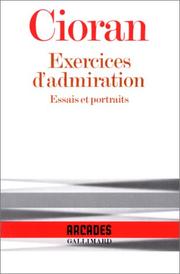| Listing 1 - 4 of 4 |
Sort by
|
Book
ISBN: 9789004193949 Year: 2011 Publisher: Leiden Brill
Abstract | Keywords | Export | Availability | Bookmark
 Loading...
Loading...Choose an application
- Reference Manager
- EndNote
- RefWorks (Direct export to RefWorks)
Political philosophy. Social philosophy --- Maistre, de, Joseph --- Political science --- Science politique --- History. --- Histoire --- Maistre, Joseph Marie, --- Political and social views. --- Influence. --- History --- De Maistre, Joseph Marie, --- Maistre, J. de --- Maistre, Joseph de, --- Maistre, Józef de, --- Mestr, Zhozef de, --- Местр, Жозеф де, --- Maistre, Joseph Marie --- De Maistre, Joseph Marie --- Maistre, Joseph de --- Maistre, Józef de --- Mestr, Zhozef de --- Местр, Жозеф де
Book
ISBN: 9780729410083 0729410080 Year: 2011 Volume: 2011:01 Publisher: Oxford Voltaire Foundation
Abstract | Keywords | Export | Availability | Bookmark
 Loading...
Loading...Choose an application
- Reference Manager
- EndNote
- RefWorks (Direct export to RefWorks)
The 18th century figure, Joseph de Maistre, has long been regarded as characterising the Counter-Enlightenment, but his intellectual relationship to 18th-century philosophy remains unexplored. This is a comprehensive assessment of his response to the Enlightenment.
Maistre, de, Joseph --- Enlightenment --- Siècle des lumières --- Maistre, Joseph Marie, --- Criticism and interpretation. --- Siècle des lumières --- Political science --- Political philosophy --- Aufklärung --- Eighteenth century --- Philosophy, Modern --- Rationalism --- Philosophy --- De Maistre, Joseph Marie, --- Maistre, J. de --- Maistre, Joseph de, --- Maistre, Józef de, --- Mestr, Zhozef de, --- Местр, Жозеф де, --- Maistre, Joseph Marie --- De Maistre, Joseph Marie --- Maistre, Joseph de --- Maistre, Józef de --- Mestr, Zhozef de --- Местр, Жозеф де --- Maistre, Joseph Marie, comte de, 1753-1821

ISBN: 2070706109 Year: 1986 Volume: 8 Publisher: [Place of publication unknown] Gallimard
Abstract | Keywords | Export | Availability | Bookmark
 Loading...
Loading...Choose an application
- Reference Manager
- EndNote
- RefWorks (Direct export to RefWorks)
Literature: authors --- anno 1900-1999 --- Literature, Modern --- History and criticism. --- Maistre, Joseph Marie, --- History and criticism --- De Maistre, Joseph Marie, --- Maistre, J. de --- Maistre, Joseph de, --- Maistre, Józef de, --- Mestr, Zhozef de, --- Местр, Жозеф де, --- Joseph de Maistre (1753-1821) --- Littérature et société --- Littérature européenne (20e s.) --- Littérature. (Mélanges) --- Letterkunde. (Versch. onderwerpen) --- Maistre, Joseph Marie --- De Maistre, Joseph Marie --- Maistre, Joseph de --- Maistre, Józef de --- Mestr, Zhozef de --- Местр, Жозеф де
Book
ISBN: 0801462606 0801462592 9780801462597 080144943X 9780801449437 Year: 2011 Publisher: Ithaca, N.Y. Cornell University Press
Abstract | Keywords | Export | Availability | Bookmark
 Loading...
Loading...Choose an application
- Reference Manager
- EndNote
- RefWorks (Direct export to RefWorks)
"A fierce absolutist, a furious theocrat . . . the champion of the hardest, narrowest, and most inflexible dogmatism . . . part learned doctor, part inquisitor, part executioner." Thus did Émile Faguet describe Joseph-Marie de Maistre (1753-1821) in his 1899 history of nineteenth-century thought. This view of the influential thinker as a reactionary has, with little variation, held sway ever since. In The French Idea of History, Carolina Armenteros recovers a very different figure, one with a far more subtle understanding of, and response to, the events of his day.Maistre emerges from this deeply learned book as the crucial bridge between the Enlightenment and the historicized thought of the nineteenth century. Armenteros demonstrates that Maistre inaugurated a specifically French way of thinking about past, present, and future that held sway not only among conservative political theorists but also among intellectuals generally considered to belong to the left, particularly the Utopian Socialists.
Europe. --- France. --- HISTORY / Europe / France. --- Maistre, Joseph Marie, --- Influence. --- France --- Historiography. --- Maistre, Joseph Marie --- De Maistre, Joseph Marie --- Maistre, J. de --- Maistre, Joseph de --- Maistre, Józef de --- Mestr, Zhozef de --- Местр, Жозеф де --- History as a science --- Maistre, de, Joseph
| Listing 1 - 4 of 4 |
Sort by
|

 Search
Search Feedback
Feedback About UniCat
About UniCat  Help
Help News
News